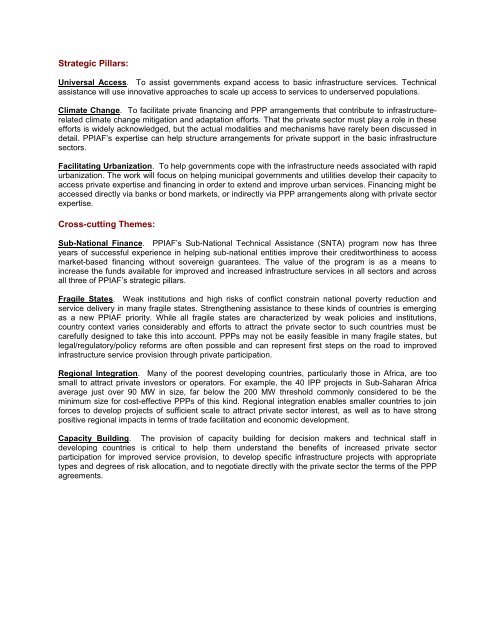PMR cover.psd - ppiaf
PMR cover.psd - ppiaf
PMR cover.psd - ppiaf
You also want an ePaper? Increase the reach of your titles
YUMPU automatically turns print PDFs into web optimized ePapers that Google loves.
Strategic Pillars:<br />
Universal Access. To assist governments expand access to basic infrastructure services. Technical<br />
assistance will use innovative approaches to scale up access to services to underserved populations.<br />
Climate Change. To facilitate private financing and PPP arrangements that contribute to infrastructurerelated<br />
climate change mitigation and adaptation efforts. That the private sector must play a role in these<br />
efforts is widely acknowledged, but the actual modalities and mechanisms have rarely been discussed in<br />
detail. PPIAF’s expertise can help structure arrangements for private support in the basic infrastructure<br />
sectors.<br />
Facilitating Urbanization. To help governments cope with the infrastructure needs associated with rapid<br />
urbanization. The work will focus on helping municipal governments and utilities develop their capacity to<br />
access private expertise and financing in order to extend and improve urban services. Financing might be<br />
accessed directly via banks or bond markets, or indirectly via PPP arrangements along with private sector<br />
expertise.<br />
Cross-cutting Themes:<br />
Sub-National Finance. PPIAF’s Sub-National Technical Assistance (SNTA) program now has three<br />
years of successful experience in helping sub-national entities improve their creditworthiness to access<br />
market-based financing without sovereign guarantees. The value of the program is as a means to<br />
increase the funds available for improved and increased infrastructure services in all sectors and across<br />
all three of PPIAF’s strategic pillars.<br />
Fragile States. Weak institutions and high risks of conflict constrain national poverty reduction and<br />
service delivery in many fragile states. Strengthening assistance to these kinds of countries is emerging<br />
as a new PPIAF priority. While all fragile states are characterized by weak policies and institutions,<br />
country context varies considerably and efforts to attract the private sector to such countries must be<br />
carefully designed to take this into account. PPPs may not be easily feasible in many fragile states, but<br />
legal/regulatory/policy reforms are often possible and can represent first steps on the road to improved<br />
infrastructure service provision through private participation.<br />
Regional Integration. Many of the poorest developing countries, particularly those in Africa, are too<br />
small to attract private investors or operators. For example, the 40 IPP projects in Sub-Saharan Africa<br />
average just over 90 MW in size, far below the 200 MW threshold commonly considered to be the<br />
minimum size for cost-effective PPPs of this kind. Regional integration enables smaller countries to join<br />
forces to develop projects of sufficient scale to attract private sector interest, as well as to have strong<br />
positive regional impacts in terms of trade facilitation and economic development.<br />
Capacity Building. The provision of capacity building for decision makers and technical staff in<br />
developing countries is critical to help them understand the benefits of increased private sector<br />
participation for improved service provision, to develop specific infrastructure projects with appropriate<br />
types and degrees of risk allocation, and to negotiate directly with the private sector the terms of the PPP<br />
agreements.

















